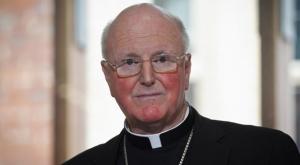We need a little less extra ecclesiam nulla salus and a little more logospermatikos.
(Catholics are welcome to pile on about a distinction without a difference.)
Just the other day I had a long and heartening conversation with a group of well educated post-Christians. All educated. All married with children. All intensively involved in political and social movements for positive change in society. Mostly pleased that their children were good kids heading on to become good adults like their parents. The kind of people whose company is a pleasure and whose example you hope others will follow. Some of whom have given up great careers to work for a pittance. Christlike, really.
And then one of them said to me. “I think I’m a pretty good person, doing good things, raising my children right. I try not to hurt people. I respect nature and other cultures. I try to be aware of my failings and correct them. I’m not perfect, I know it. So, is it true that your God will send me straight to hell when I die, but is going to accept into heaven a man who spent his whole life selling drugs, beating his wife and children, and is now on death row for committing half a dozen gang related murders but accepted Jesus Christ as his Lord and Savior when a there was a prison revival?”
Now the standard evangelical answer with which I was raised is “Yes. You are going to Hell. Because every minute of your life since being born under the dominion of sin has been an offense against God’s holiness. Everything you think you did that was good was actually evil in God’s eyes because it was done for your purposes and not God’s purposes. So you and the guy on death row are just the same in God’s eyes. Sinners in need of the saving blood of Christ. But you haven’t accepted the grace God offers in Christ and he has.”
Now the statement above could be said sweetly and sadly, or with condemnatory harshness. And evangelists have tried both. The problem is that no matter how you pitch it God comes off as an arbitrary a-hole of a supreme being who is completely unworthy of human worship. For who can worship a God who throws away the richness of good and virtuous lives while accepting into the Kingdom the thin gruel of sudden remorse and verbal assent?
Which of course can be answered with some metaphysical apologetics about the nature of God as holy, and how his judgments not human judgments are always right. I know (and you know) the pitch. It is the bread and butter of American evangelistic preaching from Jonathon Edwards through Charles Finney to Billy Graham. And if it ever actually worked to convict and convert many people (statistically it didn’t) it is now driving people from Christianity at an accelerating rate.
This way of presenting God depended entirely on hundreds of generations of socializing people to believe that they and everyone else were miserable sinners deserving of hell. And for at least a hundred years if not more (and since forever in most of the rest of the world) that process of socialization has waned to non-existence. There is no intrinsic sense of sinfulness in the human person as such. Nor is its liberal form: “existential anxiety” universal.) So when the process of socialization fails the preaching of the gospel based on fear of hellfire (or non-existence) fails as well.
Indeed it simply seems, as it seemed to the folks above, ludicrous. It is incapable of explaining to them and indeed most people today their shared experience of the world and of their own personhood.
We aren’t the first generation of Christians to have this problem. Indeed, shortly after the time of the apostles this problem was an acute hindrance to preaching the gospel. Because in the Graeco-Roman world it was clear that a great deal of what was good, relevant, and essential to the ordering of human society (and Christian communities!) came from pagan philosophers, political scientists, and rulers.
So how, those early Christian theologians were forced to ask, could good things come from polytheistic and theoretically sin-soaked society? How could it be that such insightful philosophy and productive political order derived from persons and societies sunk in the degradation of idolatry and cut off from the knowledge of God by sin?
Justin Martyr answered by asserting what is clear in scripture – that God is continually present in human society and individual hearts through the logospermatikos, or the ‘seed Word’ that precedes (and follows) the full incarnation of the Word in Jesus Christ. For Justin Martyr this in no way detracts from the preaching of the fullness of God’s self-revelation in Christ. It doesn’t even mean abandoning a robust understanding of sin and its origin – for which he offers a usefully contextualized explanation. (Did you realize that the world created by JRR Tolkien for the Lord of the Rings is built in part on Justin Martyr’s Apologia and its derivative Milton’s Paradise Lost.) And the logospermatikos allows him to claim as Christian all insights into the truth advanced in human society before the time of Jesus.
What this recognition of the logospermatikos by Justin Martyr does is to restore the credibility of the Gospel in the face of the clear fact that there is both goodness and knowledge in the non-Christian world. It creates the possibility of preaching the gospel not through an appeal to the fear of hell, but through the desirability of deepening already present virtue and truth by coming into direct relationship with their source.
And that in turn will provide a richer and more fruitful framework for grasping the evil in the world that is often so inexplicable to those whose lives thus far have been dominated by an easy virtue.
In our present age Christians need to rediscover Justin Martyr. The old evangel based on a sense of being a sinner and a fear of hell has an inevitably waning appeal as our society gradually ceases inculcating these ideas into the hearts of its members. There was a time and place for deriding the “foolishness of the Greeks.” Now is the time and place for “God has not left God’s self without witnesses.”
I know, because I met some just the other day.











